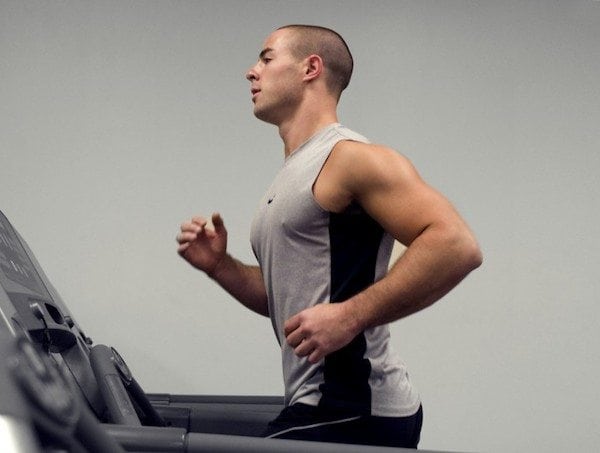No products in the cart.
The Effects of Cardio on Muscle Gains

If you ask around in your local gym whether cardio is good for muscle building or not, you’ll get two answers.
Either you’ll be told that cardio has no effect on muscle size or you’ll hear that cardio will have the opposite effect and “kill your gains”.
But as with everything you hear in the gym, these opinions are not based on fact, but rather they are based on conjecture, or bad science. This article will hopefully help to sift through the confusion and help you understand the truth.[toc]
Can Aerobic exercise prevent you from building muscle

There are two reasons why people perform cardio, either to improve their fitness or to help them lose weight.
A lot of people either perform cardio, or they perform weights, and a growing number of people combine the two.
Crossfit is an excellent example of a combination of cardio and weights. But this can also include circuit training, or even just finishing your workout with a run/row/cycle.
The main reason why people believe that aerobic exercise can inhibit hypertrophy is that chronic aerobic exercise can stimulate the release of Cortisol, a hormone that can cause muscle loss.
While this is true 1) any exercise can lead to muscle loss if you perform it for long enough, and 2) this can be prevented by limiting cardio and increasing protein intake.
So yes, if performed to a certain point aerobic can lead to a loss of muscle mass but this is both unlikely and easily fixed.
Can Aerobic exercise alone increase muscle?
Here’s where things get interesting, under certain conditions aerobic exercise has been shown to actually increase muscle! If ever you wanted proof that exercise science is not a black and white subject then this is it.
If certain criteria are met then aerobic exercise can indeed lead to muscle hypertrophy.
The first criteria that must be met is that the person performing the cardio should be untrained.
If you’ve been lifting weights for the past year then you aren’t going to gain muscle from running. Muscles need to be overloaded to grow, and unless you’ve been using some very light weights, then running is not going to do that.
Another criteria is that you should be sedentary before you start running, if you have a very active lifestyle which involves a very high step count or a job where you have to be active, then running will probably not lead to muscle hypertrophy. For the same reason as before, muscles require an overload to grow.
But if you are completely new to exercise, and have previously led a fairly sedentary lifestyle then studies have shown that you are able to increase muscle size from cardio [1].
Whilst this sounds like fairly big caveats remember that the majority of the Western World DO lead sedentary lives with minimal exercise.
The studies tend to show that only Type I muscle fibres (slow twitch) display hypertrophy, while fast twitch muscle fibres are unaffected.
This is not surprising at all, as most cardio is completely slow twitch. There also seems to be a consensus that cycling is more effective at building muscle than running.
If you have led an active lifestyle or have been exercising consistently then you can still get hypertrophic benefits from cardio, but you have to increase the intensity. So instead of low intensity steady state cardio (LISS) which is running long distances at a slow pace, you could instead perform high intensity interval training to get the same benefits.
Should I perform weights and cardio together?
We talked earlier about people who combined cardio and weights, this type of training is known as “concurrent training”.
You’d think that if cardio could in some circumstances increase muscle growth, and weights were the most effective way to increase muscle that combining the two would lead to even better results.
But while concurrent training is excellent for fat loss it actually seems to limit growth, there could be many reasons for this. But perhaps the combination leads to increased cortisol production?
Whatever the reason, training both together should be avoided.
What this means in practical terms is that you should keep your cardio to a separate day, rather than performing both on the same day.
Take Away Points
- If you have never exercised before then cardio will build muscle
- If you have exercised regularly then increasing the intensity will work
- Keep sessions short to prevent the release of cortisol
- Train weights and cardio on separate days for maximal results
- Keep protein high to protect lean body mass
So there you have it, cardio can either help or hinder your muscle building goals. Use it correctly and you will get some excellent results.
Add weight training on separate days to maximise growth, or combine the two for maximal fat loss.
Save

Cardio may not be the best muscle builder. But if you value your health then you need to do some. That’s my opinion anyway.